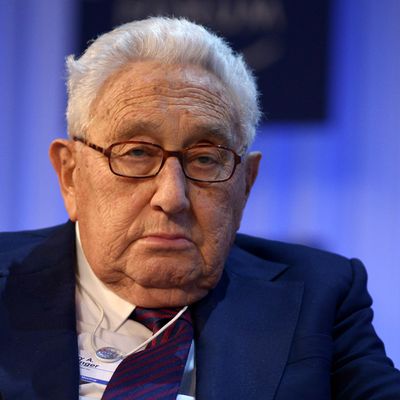
Unsightly demonstrations accusing Henry Kissinger of mass murder tend to trail him wherever he goes, and so when the former secretary of state agreed to address a Yale graduate seminar, the school asked its students to keep the appearance confidential, probably to stave off the inevitable protests. Graduate students being graduate students, word of both Kissinger’s appearance and Yale’s efforts to keep it quiet inevitably leaked, so the protests when he arrives in New Haven on Friday are bound to be louder and more vigorous. This is the permanent theater of Henry Kissinger — Nobel Peace laureate, engineer of proxy wars, accused acquiescent to genocide — and it has been running for nearly four decades: Establishment institutions at once venerate his great intellect and importance while their scholars and students simultaneously accuse him of the most heinous crimes. The pattern is schizophrenic. You wonder why Yale bothers at all.
But it isn’t just Yale. Kissinger keeps coming around, a component part of any international crisis, with all of the leaden predictability of a chorus in a Billy Joel song. He has a profile that other former secretaries of state like Warren Christopher or George Shultz, men not regularly accused of mass murder, could never approach. His cynicism is so undeviating, it is a kind of metronomic background against which the rest of the foreign policy debate plays. Whether he is writing about Ukraine in the Washington Post, or the Arab Spring in the International Herald Tribune, or talking about Syria’s chemical weapons on Face the Nation, Kissinger will caution against the rashness of humanitarian intervention and admonish the White House to avoid disrupting the international order. People — the experience of those suffering or prospering under a regime or hoping to change it, the orientation of those in power — will barely be discussed at all.
Kissinger has managed to build a public position so unassailable that when new, credible evidence emerges suggesting his complicity in mass slaughter it does not change his public image at all. This fall, the Princeton historian Gary Bass persuasively demonstrated that Kissinger and Nixon had willfully turned a blind eye to alarmed diplomatic cables documenting that their ally, the Pakistani General Yahya Khan, was massacring hundreds of thousands of his citizens agitating for independence in East Bengal. There is something truly amazing about that. But the week Bass’s book was published, Kissinger appeared on Face the Nation to discuss the crisis in Syria. No one asked him about his role in the Bengali slaughter. It was part of the background scenery, just more Kissinger theater.
Fame is always bankable, even fame of the most heinous kind. But I think Kissinger’s strange place in the culture has a more specific cause. Our tendency in the public debate is to discuss foreign policy in bizarrely abstract terms — we talk ceaselessly about the tension between the “realist” and “idealist” positions on a crisis (even though every modern American endeavor, foreign policy or not, has components of both) as if the particular human experiences overseas mattered quite little, as if foreign affairs could be understood in terms as general and cleanly theoretical as those of economics. This is a useful shorthand, insofar as it allows you to have an opinion on how the White House should act without knowing much about the country in which it will be acting.
But it has a couple of nasty side effects. One is to subtly dehumanize people who happen to live in other countries, much as Kissinger himself does, by turning the discussion of events actually happening in the world — revolutions, famine, massacres — into a kind of internal test of character and leadership: What are the president’s most fundamental commitments? Is he an idealist or a realist? Another is to elevate the most ideologically rigid foreign policy thinkers to a permanent place in the debate. Kissinger is one; the error-prone neo-imperialist reporter Robert Kaplan, who has a long and absurd piece in The Atlantic this month, is another. In a perverse way, accruing evidence of Kissinger’s amorality, like the Bengali episode, only serves to strengthen his standing as the avatar of the relentlessly cynical American perspective on the rest of the world. In this, his credentials are impeccable. At least we know where he stands.





























